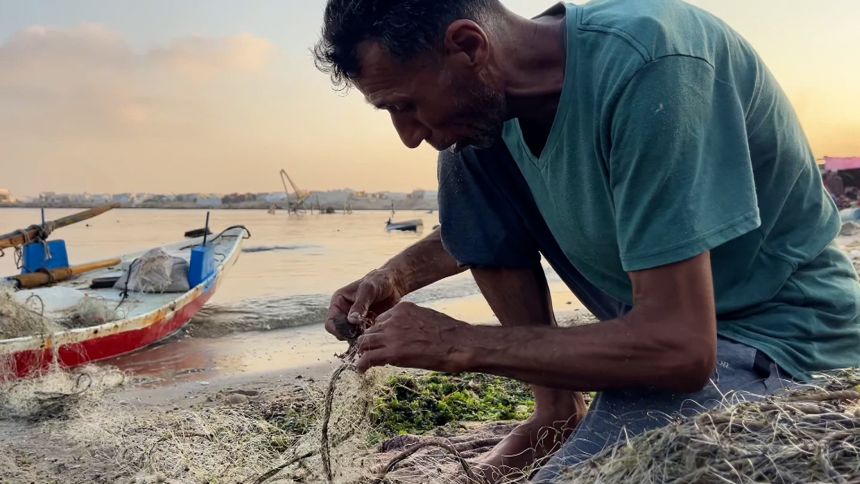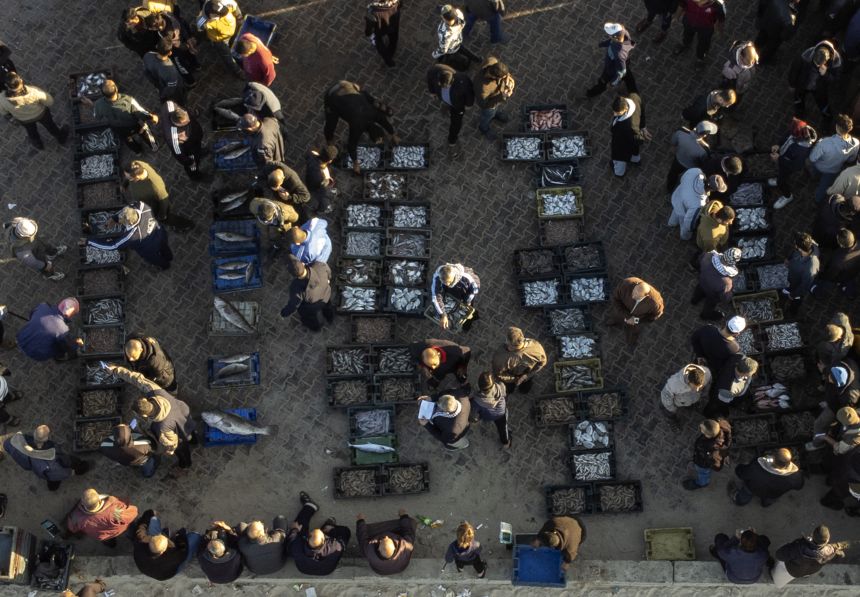Walls, tall and deadly, line three sides of Gaza. On the fourth lies the sea, stretching out to the horizon.
Its waters, and the fish within them, have long nourished Gazans isolated from the outside world.
Today, its beaches offer no respite and little shelter for the displaced, with the fishermen that once plied the shores now banned from the Mediterranean, stripping people of another desperately-needed food source.
The Israel Defense Forces (IDF) reiterated a security order banning Gazans from even swimming off the coast earlier this month.
And, as Israeli forces patrol the shore with deadly force, only the truly desperate brave the waves to try and fish another day’s survival.
Salvation just out of reach
As the world reels from images of skeletal Palestinian children and Israel’s conduct faces growing international criticism Gazans are focused on finding the next meal.
The sea has become one of the sole sources of food – albeit one now prohibited by Israel – for people on the brink of famine.
Despite the risks posed by Israeli naval forces, some fishermen prefer to risk the water rather than the fatal gunfire in the shadow of aid points.
“We don’t have any other source of food but this one,” fisherman Ziyad Abu Amira told CNN. “If I don’t bring it to my children today I die.”
“I will not go run after (aid) trucks, this is my way,” he said.

Even scraps of fish have become meals for some. Seven-year-old Fayza’s voice is tiny as she proffers the morsels she’s scavenged from fishing nets.
“I wait for the fishermen to come out of the sea and give me some, I come every day and take a little bit and head back,” she told CNN.
Further along the beach, Hussam Saadalla, 8, is an unlikely breadwinner for his nine relatives.
With a net he fashioned with a friend, he casts out into the shallows, catching the occasional tiny fish, a haul barely large enough to fill one of the child’s hands. “I’m throwing the net because we want to eat,” he told CNN.
“I’m always afraid of the naval boats, if we come a bit deeper there the naval ships shoot.”
Waves as walls
Gazans entering the water risk death from Israeli boats and aircraft, as the humanitarian crisis reaches new lows.
Even before 2023, fishermen risked being killed, shot at and detained by Israeli forces for straying too far from the coast.
Since Israel’s war with Hamas started more than 21 months ago, most fishing boats have been destroyed and Palestinians fishing just meters from the shore have been targeted, according to the UN Food and Agriculture Organization (FAO).

After the IDF announced the latest edict on Palestinians not entering the sea, “we came back after two days,” fisherman Ziyad Abu Amira told CNN as he tended to his nets. “We can’t see our children hungry.”
For years, Gazans haven’t had free access to this precious natural resource. Israeli limits on fishing activities have fluctuated with tensions with Hamas, with limits of just three nautical miles and even previous total bans on fishing imposed at times.
These limits on navigation had a direct correlation on the quality of catch available to Gazan fishermen in deeper waters.
According to the United Nations, Gaza’s fishermen produced some 4,660 tons of catch annually prior to the October 7 attacks.
Fishing supported local communities economically, providing a “critical source of protein for the Gazan population and (contributing) significantly to poverty alleviation and resilience against food insecurity,” the UN said in a report from May 2025.

Today, after Israeli forces have almost completely destroyed the Gazan fishing fleet and fish farm infrastructure, that yield is now a mere 60 tons, with fish farms completely out of operation, according to Gaza’s agriculture ministry.
The UN has stated that Gaza’s fisheries industry is now working at just 7.3% of its pre-war production capacity.
The Mediterranean has also been the site of some of the most high-profile international efforts to intercede on Gazans’ behalf. In 2010, a convoy of aid-laden civilian ships from Turkey attempted to break the blockade.
Israeli commandos raided the vessels, killing nine Turkish activists and spurring an onslaught of global criticism. Earlier this year, climate activist Greta Thunberg was detained by Israeli forces in a largely symbolic attempt to reach the Gazan coast in an aid boat.
Yet the waters still hold little solace for Gaza.
Ismail Al Amoudi, 16, comes from a family of fishermen. He now looks at the waves differently.
“Everyone is afraid when they go into the sea,” he told CNN. “We see death before our eyes.”

